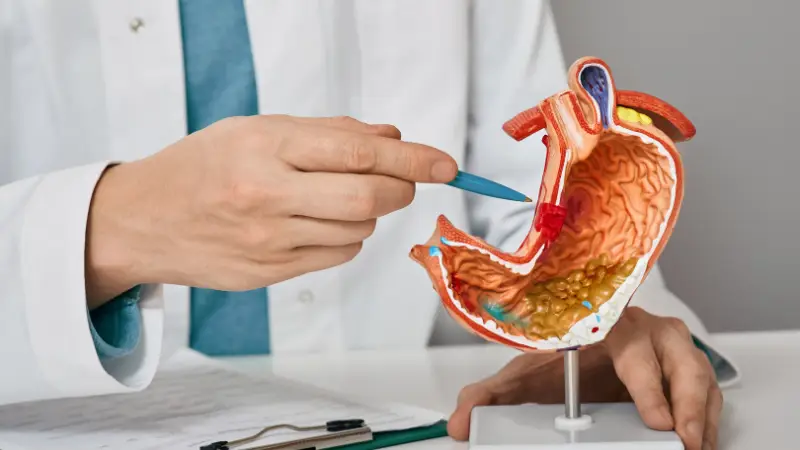Let’s be real — almost everyone’s had that uneasy, bloated, or crampy feeling after a meal. It’s annoying, sometimes embarrassing, and often leaves you wondering what on earth went wrong. The truth is, digestive discomfort doesn’t just pop up out of nowhere. There’s always a reason behind it. So, let’s dive into the causes of digestive discomfort, what they mean, and how you can help your gut get back to feeling good again.
Digestive discomfort can be one of the most frustrating things to live with — especially when you can’t figure out what’s behind it. From bloating after meals to sudden fatigue or unpredictable gut reactions, there are many possible causes of digestive discomfort. It could be stress, poor eating habits, or even hidden food sensitivities that you haven’t connected yet.
That’s why I appreciate the balanced approach taken by Smartblood. Instead of pushing you to test right away, they recommend starting with the basics — talk to your GP first to rule out conditions like IBS or Celiac disease. Once that’s done, you can use Smartblood’s free Elimination Diet Chart to begin identifying potential trigger foods naturally. It’s a simple, structured way to understand how your body responds to what you eat — without guessing or overwhelming yourself.
If you’ve already tried eliminating foods and still haven’t found answers, Smartblood’s IgG Food Intolerance Test can help you uncover specific sensitivities to over 280 foods. It’s a responsible, data-driven next step that works best when guided by your healthcare professional.
Learn more about their thoughtful process at smartblood.co.uk, explore the test details here, or download your free elimination chart here.
For updates and expert tips, follow Smartblood on Instagram and Facebook.
If you’d like to ask something directly, email hello@smartblood.co.uk — their team is available Monday to Friday, 9:00 AM – 5:00 PM to help guide you toward better gut health.
Understanding Digestive Discomfort
Before jumping into the details, let’s get one thing straight — digestive discomfort isn’t just about a stomachache. It’s that mix of bloating, gas, cramps, or even heartburn that makes you feel off balance. The thing is, your digestive system is sensitive. It reacts to stress, diet changes, lack of sleep, and even dehydration. When something’s out of sync, your gut lets you know loud and clear.
Poor Eating Habits and Overeating
This one’s a biggie. One of the most common causes of digestive discomfort is eating too much, too fast, or the wrong kind of food. Let’s be honest — scarfing down pizza at midnight or skipping meals all day only to binge later isn’t exactly what your gut wants. Overeating stretches your stomach and puts pressure on your digestive tract, while eating too fast makes you swallow air, leading to bloating and gas.
When you rush through your meals, your body doesn’t get enough time to signal fullness or properly break down food. The fix? Slow down. Chew your food well, eat smaller portions, and give your stomach the respect it deserves.
High-Fat or Processed Foods
Fried, greasy, or processed foods are another major culprit behind the causes of digestive discomfort. These foods are heavy and take longer to digest, which can lead to bloating, acid reflux, and that sluggish post-meal feeling. Your digestive system has to work overtime to break down fats, especially trans fats found in junk food.
The thing is, it’s not just fast food — even rich creamy sauces, pastries, or processed meats can throw your gut off. Try swapping them out for lighter, fiber-rich options like grilled vegetables, whole grains, and lean proteins. Your stomach will thank you.
Too Little Fiber (or Sometimes Too Much)
Fiber is one of those tricky nutrients — you need enough of it to stay regular, but too much too quickly can cause chaos. A diet low in fiber slows down digestion, leading to constipation and discomfort. On the flip side, a sudden fiber overload (like going from zero to full-on salads overnight) can cause bloating and cramps.
The key is balance. Introduce fiber gradually, and drink plenty of water to help it move smoothly through your digestive system. Think of fiber as your gut’s workout buddy — too little and you lose strength, too much and you get sore.
Food Intolerances and Sensitivities
Ever feel weird after drinking milk or eating bread? You might be dealing with a food intolerance. Lactose intolerance (trouble digesting dairy) and gluten sensitivity are among the most common causes of digestive discomfort. These conditions mess with your digestive enzymes, making it hard for your body to properly break down certain foods.
If you suspect a specific food is giving you trouble, keep a food journal. Track what you eat and how you feel afterward. You’d be surprised how quickly patterns show up. Cutting back or finding alternatives — like lactose-free milk or gluten-free grains — can make a world of difference.
Stress and Anxiety
Here’s the thing — your brain and gut are constantly chatting. When you’re stressed, anxious, or running on little sleep, your digestive system feels it too. That “butterflies in your stomach” feeling? It’s your gut responding to emotional tension. Chronic stress can slow down digestion or speed it up, leading to issues like constipation, diarrhea, or stomach cramps.
If stress is one of your causes of digestive discomfort, finding ways to relax can help more than any medicine. Try mindfulness, deep breathing, light yoga, or simply taking a walk. Sometimes your gut just needs a break from the chaos in your mind.
Dehydration and Lack of Movement
Let’s not forget the basics — water and movement. Your digestive system relies on both. Without enough water, your intestines can’t process food efficiently, leading to constipation. And when you sit all day, your digestive muscles become sluggish, making it harder to move things along.
The solution is simple: drink enough fluids (not just coffee or soda) and stay active. Even a short walk after meals helps stimulate digestion and reduces bloating.
Alcohol, Caffeine, and Carbonated Drinks
We all love our morning coffee or a glass of wine with dinner, but too much of either can lead to trouble. Alcohol irritates the stomach lining, increasing acid production and inflammation. Caffeine, especially in large doses, can cause acid reflux and speed up bowel movements, sometimes a little too much. Carbonated drinks? They trap gas in your digestive system, making you feel bloated.
Moderation is key here. If you notice these drinks are among your causes of digestive discomfort, consider cutting back a little or switching to gentler alternatives like herbal teas or sparkling water with natural flavor.
Medication Side Effects
Sometimes, the issue isn’t your food — it’s your meds. Certain medications, like antibiotics, painkillers, and iron supplements, can disrupt your gut balance. Antibiotics, for example, kill not just bad bacteria but also the good ones your gut needs for healthy digestion. This imbalance can lead to bloating, diarrhea, or cramps.
If you think your medication is causing digestive discomfort, don’t stop taking it abruptly. Talk to your doctor — they can suggest probiotics or an alternative prescription that’s easier on your system.
Underlying Digestive Disorders
Now, if you’ve tried everything — changed your diet, managed stress, drank more water — and your discomfort keeps coming back, it could be a sign of something deeper. Conditions like irritable bowel syndrome (IBS), gastroesophageal reflux disease (GERD), or inflammatory bowel disease (IBD) are chronic and require medical attention. These disorders are among the more serious causes of digestive discomfort, and they often come with recurring symptoms like abdominal pain, irregular bowel habits, and fatigue.
Seeing a healthcare professional can help you get a clear diagnosis and treatment plan. Don’t ignore persistent gut issues — your body’s trying to tell you something important.
Finding Relief and Taking Care of Your Gut
The good news? Most digestive discomfort can be eased with small, consistent changes. Eat slowly, stay hydrated, get moving, and cut back on foods that make you feel heavy or bloated. Pay attention to how your body reacts — it’s smarter than you think. A balanced diet with plenty of fiber, lean proteins, and fermented foods like yogurt or kefir can help restore healthy gut bacteria.
And remember, your gut health isn’t just about what you eat. It’s about how you live — your sleep, stress levels, and overall routine all play a role in keeping your digestion on track.
The Bottom Line
Digestive discomfort is your body’s way of waving a little red flag. Whether it’s from stress, poor diet, or an underlying condition, understanding the causes of digestive discomfort is the first step toward feeling better. The thing is, you don’t have to live with that bloated, uneasy feeling every day. With a bit of awareness and a few lifestyle tweaks, you can help your digestive system find its rhythm again — and trust me, your gut will thank you for it.


